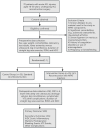Effects of injecting micro-fragmented adipose tissue (MFAT) in the tendon-bone junction region during anterior cruciate ligament reconstruction on postoperative tendon-bone healing: a protocol for a randomised controlled trial in China
- PMID: 40812815
- PMCID: PMC12352145
- DOI: 10.1136/bmjopen-2025-104249
Effects of injecting micro-fragmented adipose tissue (MFAT) in the tendon-bone junction region during anterior cruciate ligament reconstruction on postoperative tendon-bone healing: a protocol for a randomised controlled trial in China
Abstract
Introduction: Anterior cruciate ligament (ACL) injuries are among the most common sports-related injuries, often requiring surgical reconstruction to restore joint stability and function. However, inflammation and graft-to-bone healing remain critical challenges in postoperative recovery. Micro-fragmented adipose tissue (MFAT), rich in mesenchymal stem cells and anti-inflammatory factors, has shown potential in promoting tissue repair and reducing inflammation. This randomised controlled trial aims to evaluate the efficacy of MFAT injection in enhancing graft-to-bone healing at both the tibial and femoral sides and alleviating postoperative inflammation in ACL reconstruction.
Methods and analysis: This is a prospective randomised controlled trial involving 70 patients with acute ACL injuries. Participants will be randomised into two groups: a standard ACL reconstruction group and an ACL reconstruction plus MFAT injection group. In the latter group, MFAT will be prepared from the infrapatellar fat pad and injected intra-articularly during surgery. All patients will follow a standardised postoperative rehabilitation protocol. Data will be collected at baseline and 3, 6 and 12 months postoperatively. Primary outcomes include graft maturity, assessed by signal-to-noise quotient on MRI at 6 and 12 months. Secondary outcomes include visual analogue scale scores, International Knee Documentation Committee scores and inflammatory marker levels (interleukin-6 and tumour necrosis factor-alpha). Additionally, complications such as infection and graft failure will be monitored during follow-up visits.
Ethics and dissemination: This study has received ethical approval from the Ethics Committee of Weifang People's Hospital (approval number: KYLL20250105-5). Written informed consent will be obtained from all participants before enrolment. The findings will be published in peer-reviewed journals and presented at relevant conferences to contribute to evidence-based advancements in ACL reconstruction techniques.
Trial registration number: ChiCTR2500101018.
Keywords: Knee; Orthopaedic & trauma surgery; Orthopaedic sports trauma; SPORTS MEDICINE; Trauma.
© Author(s) (or their employer(s)) 2025. Re-use permitted under CC BY-NC. No commercial re-use. See rights and permissions. Published by BMJ Group.
Conflict of interest statement
Competing interests: None declared.
Figures

Similar articles
-
Bioabsorbable versus metallic interference screws for graft fixation in anterior cruciate ligament reconstruction.Cochrane Database Syst Rev. 2016 Jul 24;7(7):CD009772. doi: 10.1002/14651858.CD009772.pub2. Cochrane Database Syst Rev. 2016. PMID: 27450741 Free PMC article.
-
Prescription of Controlled Substances: Benefits and Risks.2025 Jul 6. In: StatPearls [Internet]. Treasure Island (FL): StatPearls Publishing; 2025 Jan–. 2025 Jul 6. In: StatPearls [Internet]. Treasure Island (FL): StatPearls Publishing; 2025 Jan–. PMID: 30726003 Free Books & Documents.
-
Surgical versus conservative interventions for treating anterior cruciate ligament injuries.Cochrane Database Syst Rev. 2016 Apr 3;4(4):CD011166. doi: 10.1002/14651858.CD011166.pub2. Cochrane Database Syst Rev. 2016. PMID: 27039329 Free PMC article.
-
Computer-assisted surgery for knee ligament reconstruction.Cochrane Database Syst Rev. 2014 Sep 3;2014(9):CD007601. doi: 10.1002/14651858.CD007601.pub4. Cochrane Database Syst Rev. 2014. PMID: 25180899 Free PMC article.
-
Computer-assisted surgery for knee ligament reconstruction.Cochrane Database Syst Rev. 2014 Aug 4;(8):CD007601. doi: 10.1002/14651858.CD007601.pub3. Cochrane Database Syst Rev. 2014. Update in: Cochrane Database Syst Rev. 2014 Sep 03;(9):CD007601. doi: 10.1002/14651858.CD007601.pub4. PMID: 25088229 Updated.
References
-
- Martin L, Frank M. The first results from the Danish ACL reconstruction registry: epidemiologic and 2 year follow-up results from 5,818 knee ligament reconstructions[J] Knee Surg Sports Traumatol Arthrosc. 2009 - PubMed
LinkOut - more resources
Full Text Sources
